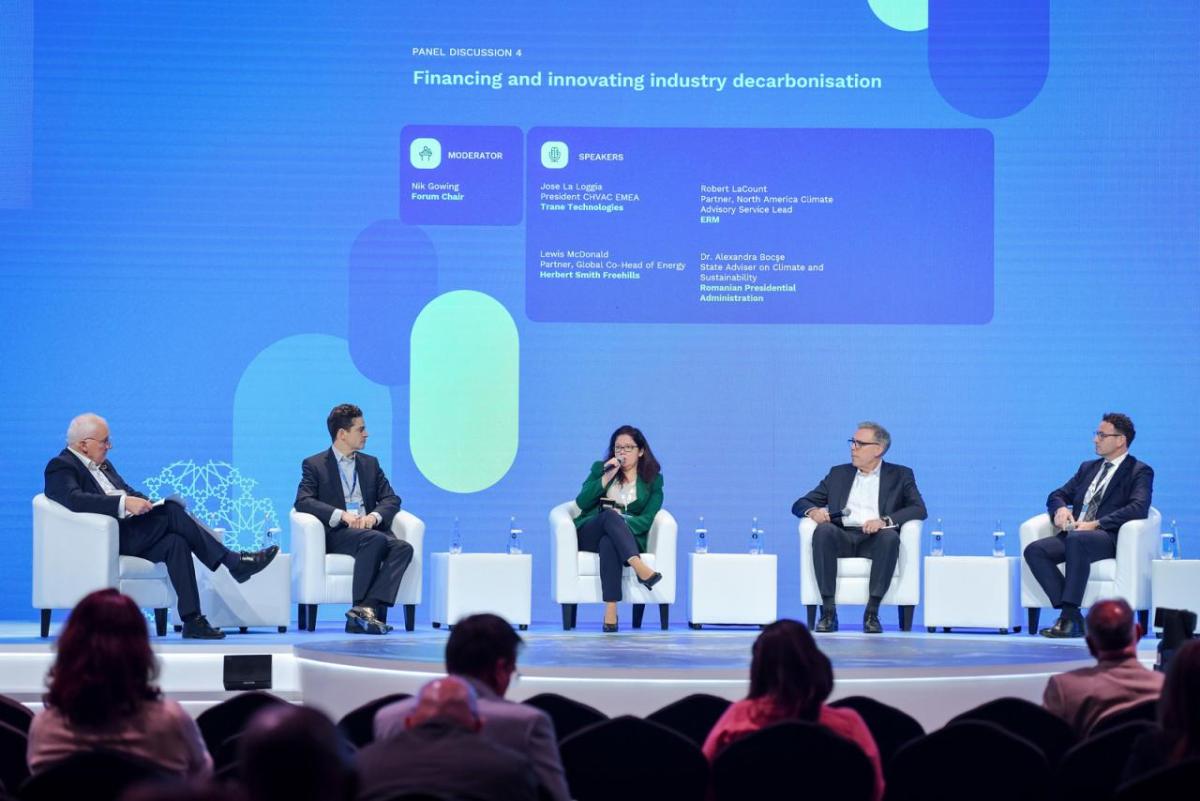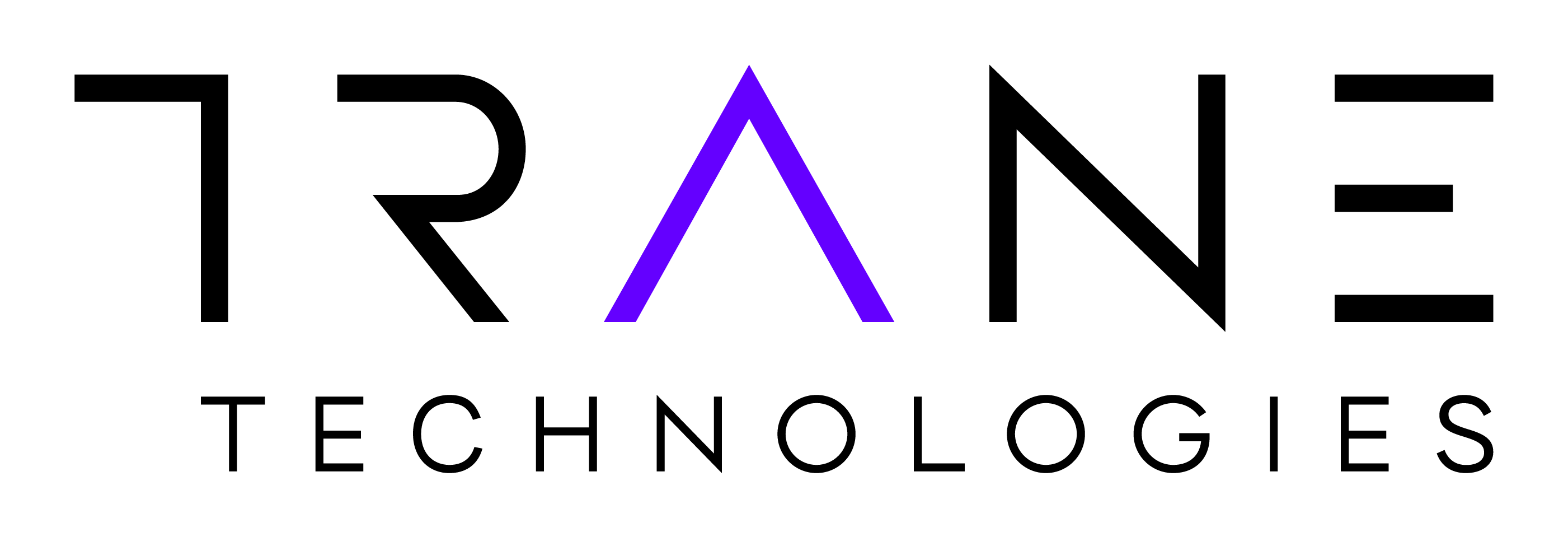Accelerating Climate Action
Trane Technologies leaders share their perspectives on COP28

At the 28th United Nations Conference of the Parties (COP28) in Dubai, Trane Technologies called for accelerated climate action, highlighting the critical need for adoption of new and existing solutions at scale and steadfastly encouraging bolder accountability.
Trane Technologies is no stranger to COP, now known as the world’s biggest business gathering, having participated in the global summit every year going back to the first COP held in Berlin in 1995. This year, the company was represented by a team of leaders, including Scott Tew, vice president of Sustainability; Jose La Loggia, president of Commercial HVAC EMEA; Helen Walter-Terrinoni, director of global climate policy; and Adnan Javed, general manager of Commercial HVAC for the Middle East. The team shared our point of view on financing for industry decarbonization, workforce innovation, accelerating climate innovation and how building management and clean transport can reduce emissions in cities through events with the Business Council for Sustainable Energy, America is All In, Climate Action, the Financial Times and the Science Museum of Minnesota.
Upon the team’s return from the UAE, we sat down to gather their impressions from the historic event and hear how they plan to accelerate action in 2024.
Q: At the conclusion of COP, delegates agreed to what is being called “the UAE Consensus,” an agreement that begins to lay the groundwork for transitioning away from fossil fuels. What do you think about the agreement?
Scott Tew, VP Sustainability: With the call to triple renewables deployment and transition energy systems away from fossil fuels, Dubai may be the most significant COP since the Paris Agreement in 2015. Is the agreement perfect? Of course not. Critics are pointing to “cavernous loopholes.” Is it a giant step in the right direction? Absolutely.
More than 200 nations—and on the sidelines, just about every major global brand—came together and said it’s time to change. We are living through the fastest and most systemic overhaul of the global economy in human history. And we get to be a part of it.
Trane Technologies has been doing this work for a long time, and we’re thrilled at this progress. The elements of the agreement track closely to our 2030 Sustainability Commitments, including targets aligned with 1.5 degrees Celsius, doubling the annual rate of improvements in energy efficiency, and transitioning away from fossil fuels in all energy systems to achieve net-zero by 2050.
We’re proud to provide customers with clean, electric-powered solutions that dramatically reduce greenhouse gas emissions in buildings, industry and transport on the path to net-zero. It is truly thrilling to be a significant enabler of the transition that is underway in the sectors we serve.
Hear more about Scott’s perspective in this video from Climate Action Group.
Q: Many people see the UAE Consensus as an exciting agreement. How does Trane Technologies plan to leverage this momentum? What else needs to change?
Jose La Loggia, President, Commercial HVAC EMEA: Fifteen percent of global greenhouse gas emissions come from heating and cooling buildings. The great news is that the technology exists today to significantly decarbonize the built environment. We just have to change the way we think about it.
Five years ago, annual global sales of electric vehicles were about 1 million. Now it’s above 10 million. Consumers understand electric vehicles, and they’re excited about them. Electrifying buildings is our next big opportunity.
At Trane Technologies, we’re working on shifting mindsets around this, helping consumers and business leaders to think about electric solutions like heat pumps as the sustainable choice, just like they would an electric vehicle.
The other big shift is around capturing waste heat. The heating and cooling industries have existed in siloes for many years. Take, for example, a milk factory, where they need industrial temperature controls for pasteurization. Traditionally, we would run chillers, rejecting heat into the atmosphere, and then burn gas to fire boilers to create heat. But there are much more sustainable options.
Our big idea is simple. It’s about capturing that waste heat and redirecting it where it’s needed. Combining heating and cooling—with sophisticated controls—in a thermal management system can be 3-4 times more efficient than traditional methods. It saves money and reduces emissions.
Why is this technology not being scaled faster? It’s about educating the market, helping consumers and business leaders see how big of an impact they can make on climate change by decarbonizing these spaces that have been overlooked as opportunities.
Learn more about Jose’s perspective in his blog, Why Breaking Down Energy Silos is the Key to Decarbonization.
Q: How does Trane Technologies support customers in reducing greenhouse gas emissions? Could you share an example?
Adnan Javed, General Manager, Middle East and Africa, Commercial HVAC: One of our customers is Pure Harvest Smart Farms, a sustainability-focused, controlled environment agriculture company based in the UAE. With the installation of a thermal management system, they are one of the first high-tech greenhouse projects in the Middle East.
Trane® designed a sustainable electrified thermal solution to meet the cooling and heating requirements of the greenhouses, which significantly improved performance. The reliability and efficiency of the electrified system directly impacted the production and cost of the produce coming from the greenhouse. The modular construction ensures minimum power and water consumption to ensure food can be locally produced at the lowest cost and highest quality.
It's a great example of electrification of heating and combined heating and cooling using a thermal system. And we are proud to have helped a successful local company in its drive to contribute to the UAE’s National Strategy for Food Security by reducing food imports, and their associated food miles and carbon footprint.
Learn more about sustainable food producer Pure Harvest in this episode of the Healthy Spaces Podcast.
Q: Why does Trane Technologies go to meetings like COP? How does climate advocacy fit into decarbonization?
Helen Walter-Terrinoni, Director of Global Climate Policy: We are building a new global system. A new way to create value and source energy. We must work across industries, nonprofits and the public and private sectors to create solutions together. Accelerating decarbonization means not only developing new technologies but also advocating for policies that support them. Technology stands ready today to have a significant impact on climate change, but we can’t do it at scale—or equitably—without strong policies in place. As a credible climate policy leader, Trane Technologies strives to have an open dialogue with policymakers and all stakeholders to build a more sustainable future for everyone. Policymakers look to Trane Technologies to better understand how to decarbonize key sectors of the economy, including developing frameworks to accelerate the uptake of effective approaches like putting waste heat to work through thermal management systems.
Read more from Helen in her blog, A Climate for Innovation.

